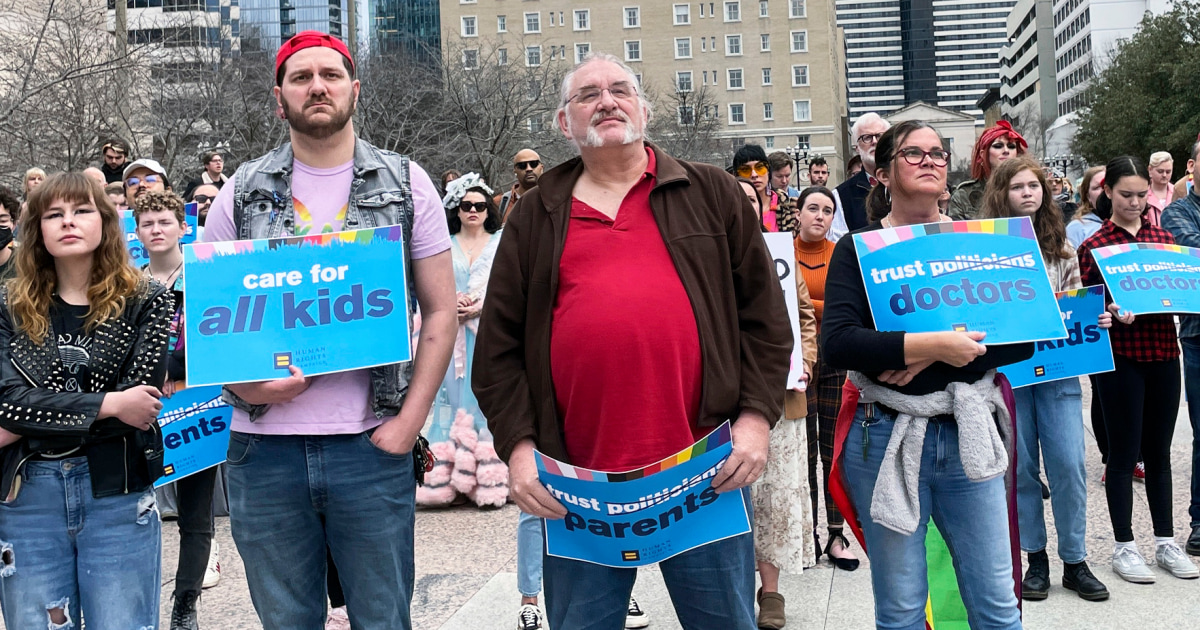
Three transgender youths, their parents and a doctor in Tennessee asked the Supreme Court on Wednesday to block the state’s ban on certain transition-related health care for minors.
If the court agrees to hear the case, it would be the first time it has considered a restriction on puberty blockers, hormone therapy and surgery for minors.
Tennessee is one of 22 states where such measures have become law.
“I’m fighting this law because I know how important this care is for tens of thousands of transgender youth like me,” one of the plaintiffs, a 15-year old referred to as L.W. in the lawsuit, said in a statement. “It scares me to think about losing the medication that I need and if this law continues, my family may have to leave Tennessee — the place I have lived and loved my entire life.”
L.W., a transgender girl, added that she doesn’t know where her family would go given how many states have passed similar legislation.
The Tennessee families and a doctor who treats trans youths argue in their petition to the Supreme Court that the state’s law violates the 14th Amendment’s equal protection clause and triggers a higher level of scrutiny in part because it discriminates against trans youths based on their transgender status by not allowing them access to certain medical treatments while still allowing cisgender children to use them to treat other conditions.
They also argue that the law violates the 14th Amendment’s due process clause, which guarantees parents’ rights to make decisions concerning the medical care of their children.
Civil rights groups, including the American Civil Liberties Union and Lambda Legal, which are representing the three families and physician, noted in their petition Wednesday that circuit courts are split on the laws: The 6th U.S. Circuit Court of Appeals and the 11th Circuit have upheld them, while the 8th Circuit has not. They asked the Supreme Court to hear the case because the circuit courts’ disagreement has created “legal uncertainty” surrounding medical care for trans youths that is “creating chaos across the country for adolescents, families, and doctors.”
Tennessee’s law was slated to take effect July 1, but it allowed doctors to continue prescribing puberty blockers and hormone therapy to minors who were already receiving them prior to the law’s effective date until March 31, 2024, according to court documents.
In late June, federal judges blocked parts of Tennessee’s law and a similar measure in Kentucky, but the judge overseeing Tennessee’s case allowed the portion of the law that bans gender-affirming surgeries for minors, which are rare, to remain in place. Just days later, the 6th Circuit — which covers Kentucky, Michigan, Ohio and Tennessee — allowed Tennessee’s law to take effect while it considered the state’s appeal. In September, a three-judge panel from the 6th Circuit voted 2-1 to allow both Tennessee’s and Kentucky’s laws to remain in effect.
Chief Judge Jeffrey Sutton of the 6th Circuit wrote in the September decision that gender dysphoria is “a relatively new diagnosis with ever-shifting approaches to care over the last decade or two.”
“Under these circumstances, it is difficult for anyone to be sure about predicting the long-term consequences of abandoning age limits of any sort for these treatments,” he wrote.
Within the medical community, access to gender-affirming care for both minors and adults is widely supported and has been found to improve mental health and reduce suicidality. More than a dozen major medical organizations — including the American Medical Association, the American Academy of Pediatrics and the American Psychological Association — support such care and have opposed the state bans.
Until the 6th and 11th circuits’ decisions, federal judges had largely ruled against restrictions on gender-affirming care for minors. Laws in Alabama, Florida, Montana and Indiana remain either fully or partially blocked, while laws in Idaho, Louisiana and West Virginia don’t take effect until Jan. 1, according to the Movement Advancement Project, an LGBTQ think tank tracking the legislation. As of now, 16 states have restrictions that are partially or fully in effect.
Regarding whether the Supreme Court will take up the case, Anthony Michael Kreis, assistant professor of law at Georgia State University, said that while a split among circuit courts often encourages the high court to hear a case, there isn’t a very deep split on this issue just yet.
He noted that, in 2014, five circuit courts had ruled on same-sex marriage bans — four against bans and one in favor — before the Supreme Court agreed to consider the issue.
As more courts rule on trans care for minors, Kreis said, the court becomes more likely to take up the issue. If it does, Kreis said the court’s decision in Dobbs v. Jackson Women’s Health Organization, which overturned Roe v. Wade and found no constitutional right to abortion, could hurt the plaintiffs in the Tennessee case, because the court found in Dobbs that the state does have a right to intervene in private medical decisions. (The 6th Circuit cited Dobbs in its decision to reinstate Tennessee’s law.)
“I fear that that will also be transported right into this arena and into this set of arguments — that the state should have this overriding interest to protect minors in a way that the court said that the state has an obligation or at least the prerogative to protect fetuses,” Kreis said.
He said the plaintiffs’ argument that care restrictions violate parental rights could be stronger, but that it could actually backfire in some ways, because supporters of measures such as Florida’s so-called Don’t Say Gay law — which prohibits instruction on sexual orientation or gender identity in grades K-8 — have cited parental rights to support them. The parental rights argument is also in part based on First Amendment rights, which are at the roots of cases where religious business owners refuse to provide services to LGBTQ people.
“What I fear is that there’s this kind of ‘live and let live’ argument that might be very well successful for one day, but may have longer-term damage down the road,” Kreis said.
Source: | This article originally belongs to Nbcnews.com










